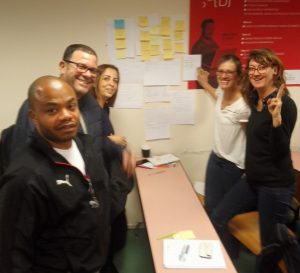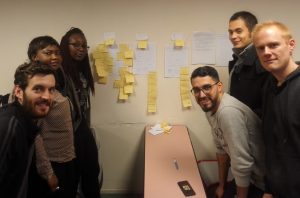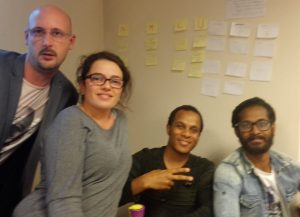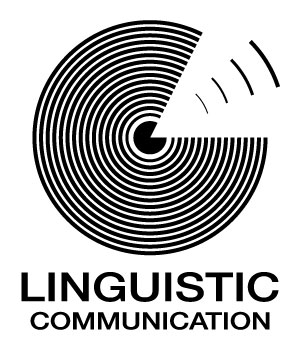Tips to passing: student evaluation
ENGLISH FOR EXPERTS EXPERTS IN ENGLISH
Students’ Evaluation Scheme
At Linguistic Communication we believe every student has her / his chance to make a difference by obtaining her / his class credit, regardless of where you think you’re starting from.
We do merit based evaluation.
This means that if you make the effort of sharing what you know with the class through participating, and contribute some honest yet simple research to the class, through preparing short but informative presentations, you will get that credit. Of course you must pass a final written test, but continuous assessment will have given you a serious head start !!!
We do project based evaluation.
If you feel the class is too difficult to follow, you can ask to work on a website for improving your level of language proficiency, based on the syntax map (link to map) we’ll guide you through the steps.
If you feel the class is not challenging enough, you can propose or ask to work on a project, or a dossier of specialization, alone or as a group.
On this website by running a search with the title of your class, below the class description you will find links to industry news publications where you can find current articles on the subject matter of the class.
|
Continuous Assessment |
Final Written Test or deliverable |
|
| DAY 1 | Participation | |
| DAY+n | Participation + Presentation | |
| DAY+n | Participation+ Presentation |
Final Test |
| 50% |
50% |
The presentation should be about a subject relating to the content of the class.
The sources that should be used can be your company infrastructure or software environment, or a mission or task that you have accomplished as part of your internship
ex : installation of hardware or software asset, market study in view of a purchase..
If you wish, you can make a presentation or report on a news article from a trade journal such as eweek.com, cnet.com which relates to the class title and content.
You may also wish, as a way to revise material seen in a technical class, to make a report on a video found on youtube or any other such website that might relate to the class content.
Your presentation is a “deliverable”, meaning that you must bring a preparation sheet to the class that you will use as a support for your presentation. If you are not satisfied with your performance, you can decide to improve your same presentation for the next class of the module.
Ideally, you should on day n+1 expand on the presentation you made on day n, so as to create a dossier of expertise, through technical and market watch.
Training professionals on Agile Scrum Project Management…





LEARNING TO LEARN!
Imagine all the possibilities that would lie before you if you were able to learn any new material quickly and efficiently- the world would be your oyster!
This course provides this very opportunity. Improve your ability to optimise your learning outcomes by discovering cognitive science’s latest findings and adjusting your learning behaviours accordingly. Explore the concepts of active listening, cognitive bias, and content chunking for better learning while reviewing techniques for building focus, managing procrastination, and optimising productive work time.
The course will allow you to dive deep into the recesses of your brain, mind and memory to change the way you process information and store it for the future, especially in the current scenario of technologically induced hyper information. Students will also discover how the cultural fabric and organisational structure of companies can impact the learning of employees. By drawing on current discussions on learning and teaching technologies and styles, this course will enable individuals to be the best students and employees they can be!
Learning Objectives:
- Acquire powerful mental tools to maximise your learning potential through cognitive science
- Self-Determination on changing learning and thinking patterns
- Identifying and mitigating cognitive bias in the social and professional environment
- Be equipped to deal with procrastination
- Increase the ability to negotiate and improve social ties
Links to promote learning:
EMPTYING THE MIND
How to learn anything:https://www.youtube.com/watch?v=EtJy69cEOtQ
Breaking old habits: https://www.opencolleges.edu.au/informed/features/8-ways-build-good-habits-break-bad-ones/
Importance of sleep: https://www.opencolleges.edu.au/informed/features/surprising-importance-sleep/
Predictive coding and the brain: https://www.opencolleges.edu.au/informed/features/predictive-coding/
https://www.wired.com/2017/02/robots-wrote-this-story/
Curiosity and memory:https://www.opencolleges.edu.au/informed/features/piquing-curiosity-helps-us-retain-boring-information-too/
Intelligence, Negotiation and Charity:https://www.nytimes.com/2020/03/27/smarter-living/negotiation-tips-giver-taker.html?algo=identity&fellback=false&imp_id=996544180&imp_id=637499826&action=click&module=Smarter%20Living&pgtype=Homepage
TECHNOLOGY AND SLEEP
Smartphones and brain power: https://www.wsj.com/video/how-smartphones-sabotage-your-brains-ability-to-focus/72E56EB0-0B92-44BF-9897-08461040E3E8.html
LEARNING HABITS
https://www.huffpost.com/entry/the-30-second-habit-that-_b_4808632
Multitasking and learning:https://www.chronicle.com/article/divided-attention/
Pomodoro technique: https://lifehacker.com/productivity-101-a-primer-to-the-pomodoro-technique-1598992730
Thinking and language:https://www.ted.com/talks/lera_boroditsky_how_language_shapes_the_way_we_think#t-840495
https://www.languagementoring.com
https://www.youtube.com/watch?v=TZYOScgVc3g
https://www.jstor.org/stable/3069211?seq=1#page_scan_tab_contents
Learning languages: https://www.youtube.com/watch?v=d0yGdNEWdn0
Learning with speed:https://www.youtube.com/watch?v=ZVO8Wt_PCgE
Learning and the brain:https://www.opencolleges.edu.au/informed/features/10-things-discovered-learning-brain-2018/
Learning styles: https://www.avadolearning.com/blog/the-7-different-learning-styles-and-what-they-mean/
https://www.inspireeducation.net.au/blog/the-seven-learning-styles/
Learning models: https://thepeakperformancecenter.com/educational-learning/learning/preferences/learning-styles/types-learning-style-models/
Myth of learning styles:https://www.theatlantic.com/science/archive/2018/04/the-myth-of-learning-styles/557687/
Memory palace:https://litemind.com/memory-palace/
Learning with distractions:https://www.npr.org/sections/ed/2016/11/05/498477634/learning-in-the-age-of-digital-distraction?t=1621855701992
ONLINE ACTIVITIES AND TOOLS:
https://www.youtube.com/watch?v=LNHBMFCzznE
https://www.youtube.com/watch?v=hdUbIlwHRkY
https://www.youtube.com/watch?v=Ks4GnfbCyD4
https://www.wired.com/2010/11/the-cognitive-cost-of-expertise/

